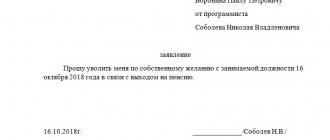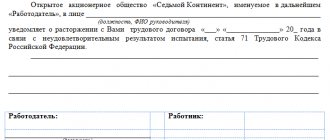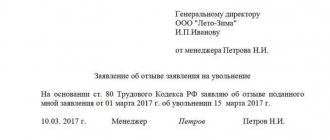Before making a final decision on the employee’s competence and his ability to properly perform his duties, the head of the enterprise has the right to hire him by setting a probationary period.
After the test period comes to an end, the employer may come to the conclusion that the subordinate cannot cope with the duties assigned to him and dismiss him on the appropriate grounds - due to an unsatisfactory test result. We will talk about the features of such termination of legal relations between the parties in this article.
Do I need to work 2 weeks?
According to Art. 70 of the Labor Code of the Russian Federation, the permissible duration of the probationary period is up to 3 months. The exceptions are the head of the organization, the chief accountant, their deputies, and heads of individual structures - for them it is possible to increase the period to six months. For persons working under a fixed-term contract for a period of 2–6 months, tests last up to 2 weeks.
Both parties have the right to terminate the employment relationship during this period, which is regulated by Art. 71 Labor Code of the Russian Federation. That is, dismissal during the probationary period is carried out according to:
- employee decision;
- initiative of the employer.
It is possible to reach a compromise between the parties by formalizing an agreement.
If an employee resigns voluntarily, you need to notify the employer in advance and know how many days you need to work upon dismissal. However, the period of work at the end of the contract during the probationary period is reduced compared to the standard one.
Is it necessary if I resign of my own free will?
If the trainee considers the job or its conditions unsuitable for him, he has the right to quit at any time, informing the manager in writing 3 days in advance (Article 71 of the Labor Code). This period also includes weekends.
The working period for the standard termination of employment is 2 weeks; during the probationary period it is reduced to 3 days.
Termination of the contract during the testing period, at the request of the employee, is carried out in several stages:
- Submitting a corresponding application to the employer in person or by mail.
- Work within 3 days or its absence for good reasons, by agreement with the manager.
- Drawing up a dismissal order and familiarizing the employee with it.
- Issuance of a work book and other working documentation to the employee (upon request).
- Carrying out calculations and calculating payments.
The working period begins on the next day after the application is submitted and registered. A standard note about voluntary dismissal is entered into the work book. The legislation allows the use of such wording even if the employee fails the test (instead of a mark of unsuitability).
On the initiative of the authorities
Dismissal of an employee during a check of his professional qualities is permitted subject to compliance with the mandatory requirements:
- The employee must be informed about the termination of the employment relationship at least 3 days in advance.
- The leader identifies the reasons behind his decision. These include:
- disciplinary actions;
complaints from colleagues or clients;
- lack of qualifications and so on.
The employee must provide an explanation for his actions.
The employee has the right to appeal the manager’s decision in court, so the employer will need to confirm all evidence of unprofessionalism and violations.
The dismissal procedure then includes:
- 3-day work.
- Making an order.
- Payment of funds (including for unpaid vacation).
- Issuance of a work book. It contains a record of failure to complete the probationary period with reference to Art. 71 TK.
The employee must confirm in writing that he has read the documentation. Since the employee did not pass the test, severance pay is not accrued to him. It is possible to terminate the employment relationship without working off, by agreement between the parties.
An employer does not have the right to fire a person on a probationary period if he is on sick leave. This is permissible only by voluntary decision of the employee. And about dismissal after the probationary period is described here.
also not allowed to terminate a contract with a pregnant woman. According to the law, a probationary period is not applicable to her at all, but it happens that an employee finds herself in this situation already during the inspection period - then the employer does not have the right to fire her.
A woman can leave work only of her own free will.
Calculation upon dismissal, what payments and compensations are due to the employee?
When an employee is dismissed from a contract during a probationary period, he is still paid a salary , as well as other due amounts. It all depends on how long the employee has worked in this organization.
If the contract is cancelled, then the accounting department does not make any calculations, and otherwise the management is obliged to pay the employee in accordance with the law. He must pay :
- official earnings in accordance with the official salary and allowances;
- compensation benefits for unused vacation days;
- severance pay, if specified in the internal documents of the organization;
- overtime.
After submitting the employee’s application, the management hands him a work book and other necessary documents if desired.
Any retention of documentation is unacceptable, but if the employee is a financially responsible person, then in such situations everything is a little more complicated.
The employee must hand over the property entrusted to him intact or transfer all assets to another person. If this does not happen, then he is held liable .
How can you terminate an employment contract during an internship in one day?
In some cases, a trainee may be able to avoid the statutory period for completion of employment. To answer the question - can you quit without working for two weeks, you need to know that there must be good reasons for this, which he can document:
- Relocation of the wife/husband to work in another region or country.
- Guardianship of a disabled relative who requires care.
- Staying on sick leave.
- Full-time education at an educational institution.
- Retirement.
- Conscription into the army.
- Violation by the employer of the terms of the contract or labor legislation.
An employee has the right to resign without working through a personal agreement with the manager, which must be documented (in a statement, additional agreement). He can justify his desire with other reasons.
How not to work off
Information about this in Art. 80 Labor Code of the Russian Federation.
But below we will still indicate the methods. First of all, this is by mutual agreement with management. In many cases, they accommodate a newcomer who has decided to quit before the end of the probationary period. Especially if this happens at the beginning of testing.
There are also reasons why dismissal without service is possible:
- The employee entered a university full-time.
- Leaves for military service upon conscription (conscription).
- He has been diagnosed with a disease that prevents him from further performing his professional duties.
- The employee's health condition requires immediate relocation to another region.
- A family member is transferred to another locality (region) due to his professional activities. Typically, this item in the application is indicated “for family reasons.”
All of the above facts must be supported by appropriate documentation. Without them they will not be arguments.
There is one more way, one might say, as a last resort. This is going on sick leave.
Statement
There are no legal requirements for filling out a resignation letter; any form of resignation is acceptable. The document contains information:
- Business name.
- Full name of the manager or other authorized person.
- Full name and position of the applicant.
- Statement of the request to dismiss at one's own request.
- Next, the date of termination of the contract is indicated, which is calculated from the next day after writing and registering the application by adding 3 days. For example, an application is submitted on Monday, March 1, and the dismissal date will be March 4, Thursday. On March 5, the employee may not go to work.
- Indication of good reasons for resigning early.
- Date of completion and signature of the employee.
If there will be no work or an agreement with the employer is planned, the date of dismissal may not be included in the application. Only the day the paper was filled out is indicated.
Sometimes organizations have their own forms, so it is recommended to contact the HR department before filling out the document. The application must be submitted no later than 3 days before the date of dismissal.
- When sending a document in person, it is advisable to prepare it in 2 copies, both of which are registered by the receiving person. One of the papers remains with the employee. He also has the right to demand in writing the provision of other working documentation (order, act of violations, etc.).
- The application is sent by registered mail with notification. In this case, it is not advisable to set a date of departure, since the countdown of three days will begin when the employer receives the document.
Entry in the work book
The work book is filled out and returned to the citizen at the end of the last working day. A record is made according to the same rules as for dismissal for any other reason.
When employed for a probationary period, no notes about this condition are made in the work book. Therefore, if an employee passes the test and remains at work, then no additional entry is made about this.
The document is filled out on the basis of the prepared order (T-8 form). And the entry makes reference to Article TC 80 (employee initiative). Abbreviations in entries are not allowed.
Example entry:
“Dismissed in accordance with clause 3 of part 1 of article 77 of the Labor Code of the Russian Federation (employee initiative).”
Can an employee be fired without his or her desire?
The labor legislation of the Russian Federation gives the employer permission to check the professional qualities of an employee upon admission to the organization. In this case, the manager has the right to dismiss a person without his desire while he is on a probationary period, having notified him in advance and indicating the grounds for his decision. The employer must meet two conditions:
- confirm why he considers the test results to be unsatisfactory;
- give the employee three days' notice.
An employee can also be dismissed for other reasons specified in Art. 81 Labor Code of the Russian Federation:
- personnel reduction;
- liquidation of the company;
- disciplinary offenses (they must be recorded in a special act, in the presence of witnesses);
- changes in the terms of the contract and the employee’s disagreement with them;
- relocation of the company to another region, refusal of the employee to move.
In these cases, the general rules apply, even though the employee is on a probationary period.
They cannot terminate a contract against their will with persons on sick leave before its closure and with pregnant women.
Basic Concepts
The probationary period, according to the Labor Code of the Russian Federation, is considered to be the period of time during which the manager checks the working qualities of his new subordinate. This includes:
- Ability to cope with the assigned task;
- General discipline;
- Compliance of the employee’s skills with his professional education.
For citizens holding non-managerial positions, this period cannot last longer than 90 days. But for chiefs, their deputies and persons related to government agencies, Art. 70 of the Labor Code of the Russian Federation provides for a probationary period of up to six months.
In this case, the days on which the subordinate was absent from the workplace (due to vacation, illness, family circumstances, etc.) will be taken into account separately, thereby extending his initial introductory period. In case of violation of labor discipline during the internship, the same responsibility is provided as for full-fledged employees of the enterprise.
The only differences between the probationary period and the standard working regime are a reduced number of working hours per day and a reduced wage rate. Among the exceptions to which internship does not apply under the Labor Code of the Russian Federation are:
- Citizens who came as a result of competitive selection;
- Pregnant;
- People raising a child under 1.5 years of age;
- Minors;
- Students;
- Applicants, provided that this vacancy is of secondary importance to them;
- Seasonal workers, provided they are employed for a period of less than 2 months.
It is important to know! In this case, the employer must indicate in the contract that the citizen will undergo a temporary internship (the duration of this period does not have to be mentioned). Is it possible to resign during a probationary period without working, and how best to do this from the point of view of the law, we will find out later in the article.
How to avoid detention?
- A citizen who resigns during a probationary period can avoid service by personal agreement with the employer. It is advisable to propose such an agreement if the manager does not have clearly substantiated reasons for terminating the contract. In this case, there is a high probability that the director will agree, since the employee’s voluntary consent to leave will be documented. If legal proceedings arise regarding the illegality of dismissal, this agreement will work in favor of the defendant (company).
- It is possible to avoid working time by taking out sick leave. Sick days are counted in a three-day period. There is no need to work after the sheet is closed; the employee is considered dismissed.
- If an employee has valid reasons for dismissal, you need to talk about them. For example, he urgently goes into the army, although he had no intention of getting a job, or undergoes treatment that cannot be postponed, and does not want to take out sick leave.
In the absence of legal grounds and the consent of the employer, the employee will still have to be released from work before the three-day period. Otherwise, the company may file a disciplinary violation and dismiss the employee under the article, and not at his own request. This is disadvantageous for the employee, since it will negatively affect his future career.
Dismissal of an employee during a probationary period is considered a simplified procedure, but has its own characteristics. One party must notify the other of termination of the contract at least 3 days in advance. In this case, the employer is obliged to indicate the grounds for his decision . The working period is shortened in comparison with the standard dismissal procedure: it is not 2 weeks, but only 3 days.
The legislative framework
- In accordance with the legislative framework of the Russian Federation, the duration of the probationary period should not exceed 3 months.
- There are persons whose probation period has longer periods. For example, for employees of municipal and civil authorities, the probationary period can last from 3 months to a year.
- The shortest duration of the probationary period is provided by law for those employees who have entered into a fixed-term contract with the employer. It does not exceed 2 weeks.

Agreement of the parties
In Russia, an agreement regarding a probationary period is drawn up by mutual agreement between the employer and employee.
In connection with this issue, you need to pay attention to two important details:
- In no case does the employer have the right to dictate his terms to the employee when hiring him for a probationary period.
- All conditions of the test must be clearly stated in the formal contract. If the contract does not indicate the time period in accordance with which he is tested, this means that the employee was accepted without testing.
In addition, the following persons are not subject to probation:
- employees who have passed a competition allowing them to fill a vacant position;
- citizens who have not reached the age of majority;
- specialists who graduated from a university or received secondary education and began performing their official duties immediately after graduation;
- a woman expecting a child or already having a baby under one and a half years old;
- citizens who were transferred to a new position from another job with the consent of the heads of organizations;
- persons who have a student agreement giving the right to enter this position upon completion of incomplete secondary education.
Adviсe
You can advise an applicant for a new job the following:
- If you are hired for a probationary period, ask the employer to brief you on the main provisions of the contract being concluded. Let him explain to you what your direct responsibilities are, ask him to provide a job description.
- If you encounter certain difficulties during your work, you have the right to write to your boss an official explanatory statement signed by witnesses.
- The absence of comments can characterize you as a positive employee.
- If the employer decides to fire you for good reasons , you can complain to the judicial authorities. If the court finds that you are right, you will be reinstated to your previous position.
- You should also complain if you are fired during study leave or illness.
The employer can be advised to:
- There are many cases where dismissed workers are reinstated through the courts. Therefore, before dismissing an employee, you must clearly document the reasons for the professional unsuitability of the new employee.
- It is very important to rely on the provisions of the law and take into account all the clauses of the contract. Only in this case will the dismissal of an employee who has not completed the probationary period be legal.









